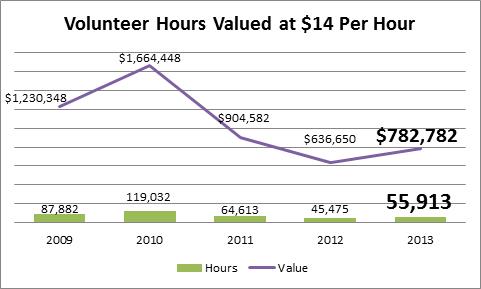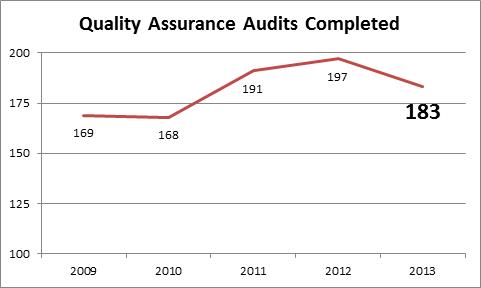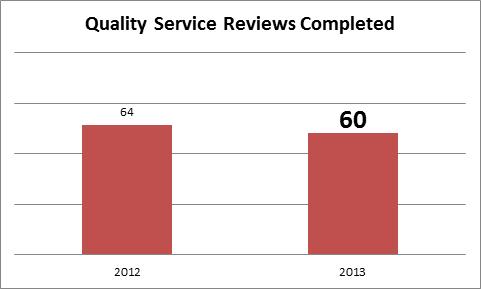DJJS Administration is responsible for administration of all mandated duties, division policy development, centralized fiscal services and budgetary development, program planning and evaluation, research, training, and quality assurance. DJJS Administration is also accountable for oversight and quality control of the division's activities. Program offices direct the day-to-day operations of the division (UCA 62A-7-104(2)).
During the 2015 General Session, the Legislature appropriated for Fiscal Year 2016, $4,576,600 from all sources for Administration. This is a 3.6 percent increase from Fiscal Year 2015 revised estimated amounts from all sources. The total includes $4,269,700 from the General/Education Funds, an increase of 44.1 percent from revised Fiscal Year 2015 estimates.
In addition to statewide compensation and internal service fund cost increases, the following appropriation adjustments were made during the 2015 General Session:
Number and value of volunteer hours
Volunteer Hours Contributed and Valued at $14 Per Hour
Volunteers are critical to the success of youths in the Division's care. Volunteers regularly mentor and teach youths on a variety of topics that help the youths find satisfaction through everyday activities and help the youths find satisfaction through everyday activities and help them become more productive citizens when they return to the community.

Quality assurance measurement of contracted JJS providers
Quality Assurance Audits Completed
The Quality Assurance Team audits all DJJS contracted private providers for residential and out-patient services, as well as DJJS vendor contracts to assure contract compliance. The Quality Assurance Team also audits state-operated programs to ensure compliance with agency Operations Manuals and DJJS Policy and Procedures.

Top indicators of success of Juvenile Justice Services
DJJS administration has provided the three measures it feels are most indicative of its success, they are: 1) Number of quality service reviews completed, 2) Number of quality assurance audits completed, and 3) Number of volunteer hours contributed and the value of those hours at $14 per hour.
Quality Service Reviews Completed
The Quality Service Review process is a structured case review method used to examine key functions of service delivery systems, identify client outcomes and the particular elements of practice that contribute, or are needed, to produce positive results. The goal is to generate useful information for staff at all levels as to outcomes for youth and families served, strengths and needs of local practice and opportunities for improving system performance. The administration began tracking this measure in FY 2012. The number of reviews decreased in FY 2013 as the number of case management positions was reduced.

In addition to administrative responsibilities, the DJJS director represents the division in a variety of settings including: division director within the Department of Human Services; member of the Utah Commission on Criminal and Juvenile Justice; member of the Sentencing Commission; member of the Substance Abuse and Anti-Violence Coordinating Council; and chair of the Commission on Criminal and Juvenile Justice - Juvenile Justice Committee.
DJJS Administration is organized into five bureaus:
- Research and Evaluation. Promotes ongoing research, evaluation, and monitoring of division programs to determine their effectiveness in providing services to delinquent youth.
- Investigations. Investigates non-routine, unusual, or potentially threatening events related to clients in division and contracted programs.
- Training. Emphasizes professionalism and maintains the latest, most effective treatment methods focusing on the proper care of youth in division programs; it also coordinates the volunteer efforts throughout the division.
- Clinical. Coordinates the treatment of youth in secure care.
- Administrative Services. Controls and monitors administrative functions in the division, including accounting, budgeting, grants, contracts, technology, reporting, and compliance.
COBI contains unaudited data as presented to the Legislature by state agencies at the time of publication. For audited financial data see the State of Utah's Comprehensive Annual Financial Reports.